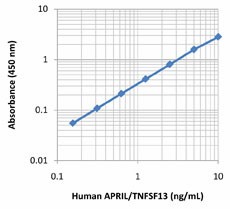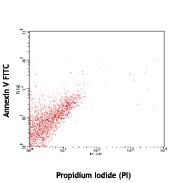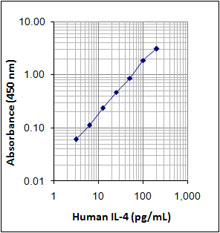- Regulatory Status
- RUO
- Other Names
- A Proliferation Inducing Ligand (APRIL), TALL-2
- Ave. Rating
- Submit a Review
- Product Citations
- publications

A Proliferation-Inducing Ligand (APRIL), also known as TNFSF13, as its name suggests, stimulates cell proliferation. It is a member of the TNF superfamily of ligands, being most closely related to BAFF, with which it shares 30% amino acid sequence identity. APRIL is cleaved intracellularly by furin and is believed to exist mainly in a secreted, soluble form. As with most other TNF family members, APRIL exists as a functional homotrimer (total MW = 90 kD). It can bind to two cell surface receptors, BCMA and TACI, which it shares with BAFF to exert downstream T- and B-cell regulatory effects. It also possesses a heparin binding domain and has been demonstrated to bind to proteoglycans on the cell surface.
APRIL is most well known for its tumor proliferation effects. It is a potential biomarker, with serum levels elevated for certain cancers and expression levels elevated in cancer tissues. It is also a potential biomarker for certain autoimmune diseases. In fact, recombinant TACI is currently in clinical trials as a neutralization drug against APRIL and BAFF for the treatment of Systemic Lupus Erythematosus (SLE).
Besides forming homotrimers, APRIL can also form functional heterotrimers with BAFF. The stoichiometric relationship of the protomeric units is still unclear, however it appears that these heterotrimers are significant in that they are elevated in the serum of certain autoimmune patients.
APRIL also forms an endogenous chimeric protein with another related protein, TWEAK, effectively called TWE-PRIL. It is believed that TWE-PRIL is membrane bound and consists of the N-terminus of TWEAK with its transmembrane domain, and the C-terminus of APRIL with its receptor binding domain.
BioLegend's LEGEND MAX™ Human APRIL/TNFSF13 ELISA Kit is a sandwich Enzyme-Linked Immunosorbent Assay (ELISA) with a 96-well strip-well plate that is pre-coated with a monoclonal capture antibody. This kit is specifically designed for the accurate protein quantitation of human APRIL/TNFSF13 from cell culture supernatant, serum, plasma, and other biological fluids. It can detect APRIL-BAFF heterotrimers, in addition to APRIL homotrimers. It is analytically validated with ready-to-use reagents.
Kit Details
- Kit Contents
-
- Human APRIL/TNFSF13 Pre-coated 96-well Strip Microplate
- Human APRIL/TNFSF13 Dectection Antibody
- Human APRIL/TNFSF13 Standard
- Avidin-HRP A
- Assay Buffer A
- Wash Buffer (20X)
- Substrate Solution F
- Stop Solution
- Plate Sealers
- Materials Not Included
-
- Microplate reader able to measure absorbance at 450 nm
- Adjustable pipettes to measure volumes ranging from 1 µL to 1,000 µL
- Deionized water
- Wash bottle or automated microplate washer
- Log-Log graph paper or software for data analysis
- Tubes to prepare standard dilutions
- Timer
- Plate Shaker
- Polypropylene vials
Product Details
- Verified Reactivity
- Human, Non-Human Primate
- Application
-
ELISA
- Additional Product Notes
-
View more applications data for this product in our Scientific Poster Library.
- Product Citations
-
- Sensitivity
- 0.038 ng/mL
- Standard Range
- 0.16-10 ng/mL
- Materials Not Included
-
- Microplate reader able to measure absorbance at 450 nm
- Adjustable pipettes to measure volumes ranging from 1 µL to 1,000 µL
- Deionized water
- Wash bottle or automated microplate washer
- Log-Log graph paper or software for data analysis
- Tubes to prepare standard dilutions
- Timer
- Plate Shaker
- Polypropylene vials
Antigen Details
- Biology Area
- Apoptosis/Tumor Suppressors/Cell Death, Cell Biology, Signal Transduction
- Molecular Family
- Cytokines/Chemokines
- Gene ID
- 8741 View all products for this Gene ID
- UniProt
- View information about APRIL on UniProt.org
Related FAQs
- In your LEGEND MAX™ ELISA Kits, there is a step that calls for washing the plates before adding sample. What is the purpose of this step?
-
We typically use a stabilizer for pre-coated plates. The additional washing step is designed to remove these components before you start the assay. If you do not perform the washing, the effect on assay performance is negligible.
- I have multiple LEGEND MAX™ ELISA kits that I want to run simultaneously. Can I use the same wash buffer for all the kits?
-
The wash buffer provided in all our LEGEND MAX™ kits is the same and the part numbers on the wash buffer bottles in these kits should be identical. For ELISA MAX™ Deluxe and ELISA MAX™ Standard Sets, we provide a recipe for the wash buffer on each kit’s technical data sheet. This recipe is the same for all ELISA MAX™ sets.
- For some of your ELISA kits, why do my serum samples require dilution with assay buffer?
-
In some cases, dilution with assay buffer is required to minimize the matrix difference between the samples and the standards to achieve better accuracy.













Follow Us